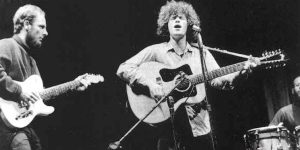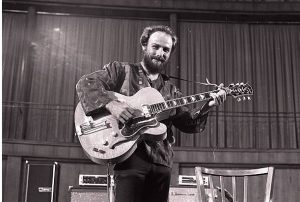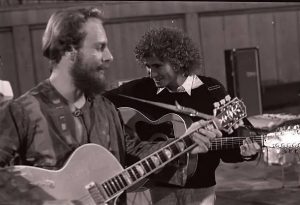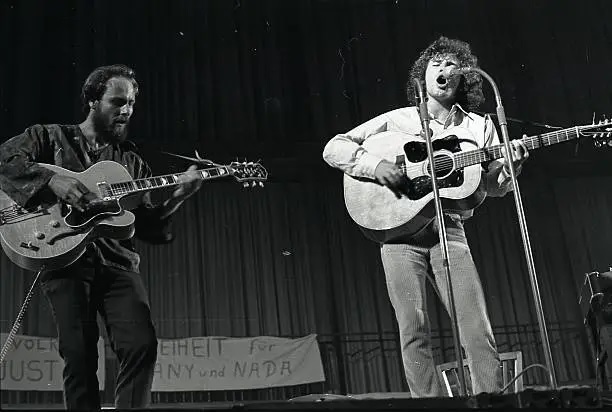HIT CHANNEL EXCLUSIVE INTERVIEW: October 2011. We had the great honour to talk with a legendary musician: Lee Underwood. Lee was Tim Buckley’s lead guitarist and his best friend during the most of Tim’s life. After Tim’s death he became a respected music journalist writing for great magazines and newspapers like Rolling Stone, Los Angeles Times and Down Beat. His last solo album is “Gathering Light”. Read below the very interesting things he told us:
Which are the current projects you’re involved in? Are you doing any recordings this period?
At the moment, I’m laying back and surveying everything I have done along the way – playing lead guitar with Tim Buckley and writing my book about him (Blue Melody: Tim Buckley Remembered). The writings I did with music publications after Tim (including Down Beat, Rolling Stone, L.A. Times, etc.). The writings I have done for my web site (at www.leeunderwood.net). The guitar and piano music I have recorded (California Sigh [solo guitar]; Phantom Light and Gathering Light [both solo piano]). And my recent book of poetry, Timewinds. Kind of tricky finding new directions to explore, but I’m confident they will emerge.
 Are you satisfied from the feedback you got from listeners and press for your “Gathering Light” album?
Are you satisfied from the feedback you got from listeners and press for your “Gathering Light” album?
I got some very good reviews of that solo piano CD (see Amazon.com), but of course one can always use more. If I were better at marketing, my work would get more attention. Meanwhile, the people who have acquired the albums have enjoyed the music very much.
“Timewinds” is your latest poetry book.Which are the subjects of these poems?
I love to explore all levels of human experience, from anger and confusion, to sensual and intellectual pleasures, to radiant higher consciousness, and I love to play with language. As well, At heart, I am a Zen mystic who lives with his wife and two cats in a cabin in the woods. I walk in the woods almost every day, think about the human mind, then move into writing. Poetically, Timewinds is an effort to explore virtually the entire spectrum of human consciousness, especially the higher reaches. Much of my more recent writing appears in a book on my site entitled Diamonds in the Sky.
“Blue Melody: Tim Buckley Remembered” is the absolute Tim biography. How difficult was emotionally to write and remember all these details?
Indeed, when Blue Melody came out, Uncut music magazine in Britain cited it as one of the ten best music biographies of the year. It was not unduly difficult to write, as I had carried the entire book around in my head for 25 years. I sat down and wrote it in three months, moving into those tempestuous emotional zones gracefully, without becoming so identified with them that I lost myself. It was not always easy, of course, but easier than I thought it would be, because it was not an ego trip on my part. It was a service to Tim and his music, his life, and his extraordinary creative evolutionary development. Some people still do not understand that fundamental service part.
 Were you frustrated by the lack of commercial success and some poor reviews that classic albums (today) like “Greetings From L.A”, got when they were released?
Were you frustrated by the lack of commercial success and some poor reviews that classic albums (today) like “Greetings From L.A”, got when they were released?
I was not frustrated, but I was dismayed. Greetings should have been a hit. Some of Tim’s all-time best songs are contained in that album and in the final two studio albums as well. The new double-CD that is coming out, entitled Tim Buckley: Starsailor The Anthology, includes a number of those songs and will give listeners a new appreciation of the full arc of Tim’s creative brilliance.
Did you expect Tim’s early death or did you believe that he would overcome his addictions?
It is my understanding that Tim was not addicted. He used drugs and alcohol for creative stimulation and emotional relaxation. The drugs did not use him. His death came about through both alcohol and heroin, not just heroin, and the accidental overdose was due in part to the fact that his system had been clean while performing on the road. He partied too hard when he came back. His clean system couldn’t take it. Fade to black.
Who is your biggest influence as a musician and who as a writer/poet?
Impossible to answer that with any precision, so I’ll just say – Bach, Chopin, Alexander Scriabin, and Keith Jarrett in the piano domain. John McLaughlin, Spider John Koerner, and Pete Cosey in the guitar domain. Overall big picture: Miles Davis. As a writer – Gerard Manley Hopkins, Dylan Thomas, James Joyce, Nikos Kazantzakis, Han-Shan, Ken Wilber (along with many others).
Did you ever meet Jeff Buckley? Do you like the music he made?
In the Coda section of Blue Melody, I write about meeting and talking with Jeff at length on two occasions, and about my insights into his music and his love/hate relationship with Tim. Strong stuff, all of it. I think Jeff was brilliant, a top-flight, first-class singer and songwriter, forever linked with his innovative father.
Jeff Apter, an Australian writer, wrote a great book about Jeff, entitled A Pure Drop. Train Houston, a Los Angeles producer/screenwriter, has written a terrific, insightful, emotionally powerful film based on that book. Hopefully it will be out within the next year or so. Of the three Jeff Buckley films in the works, Train’s is far and away the best.
You are a L.A musician. Had you ever played with members of bands like The Doors or Love? Did you like L.A blues/rock scene of that period?
I did a couple of gigs with Love, Tom Rush, and a few others, but my main contributions went to Tim and his music. In truth, I was so dazzled by Tim’s evolutionary process that I found much of the blues-oriented rock scene to be somewhat repetitive, boring, and loaded with too many cliches. Still, given that reservation, I did enjoy the music of Pink Floyd, Crosby/Stills/Nash/Young, Fred Neil, Richie Havens, Jimi Hendrix, and a number of others.
 Do you have happy memories from your Down Beat years? Do you still contribute in magazines?
Do you have happy memories from your Down Beat years? Do you still contribute in magazines?
I was West Coasted Editor of Down Beat from 1975 to 1981 or so. Living in L.A., I had access to virtually all significant jazz musicians of the day. One of my greatest learning experiences was talking to jazz geniuses and writing feature interviews about them – John McLaughlin, Chick Corea, McCoy Tyner, Joe Pass, Art Pepper, dozens of others. Great people, who gave me a great education. I stopped writing for magazines in 1990, when I moved to New Mexico (and later on, back to California).
Have your ever been to Greece? Send a message to Greek fans.
I have never been to Greece, but I have loved Greece for many years, not only its incredible golden past, but its present-day people as well – the sunshine, the Mediterranean, the vitality and sensuality, the great food, the incredible music. I dearly hope I can visit someday. My message to Greek fans? – Follow the music in your heart. It will always lead you right. Hang in, hang on, and don’t hang it up. And most of all, dance, dance, dance!
A huge “THANK YOU” to Mr Lee Underwood.
Check out www.leeunderwood.net


